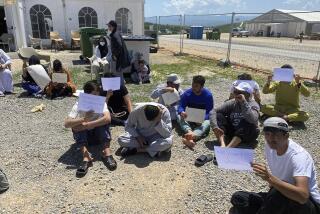Canadians Make It Easy to Defect : This Way Out to Freedom: Refueling Stop at Gander
- Share via
GANDER, Canada — Nothing here resembles the Statue of Liberty, but for more and more people, this drab little Newfoundland city represents a chance for the freedom and opportunity denied them in their homelands.
More than any other place in North America, Gander is the place where people without proper documents can enter Canada legally. People defecting from the Soviet Union, Cuba and such non-Communist totalitarian countries as Iran speak of the “Gander connection.”
Every week, airliners from the Soviet Union, Cuba and East Germany put down on this island 600 miles northeast of Boston to refuel and give their passengers a break on the long flights between Eastern Europe and Cuba.
And, virtually every week, some passenger sidles shyly up to a police officer or an immigration official--even to the cashier at the duty-free store--and says the word “refugee.” So far this year, 49 men, women and children have refused to reboard their planes, explaining that their lives would be in jeopardy if they were to return to their homes.
According to Terry Loder, the local head of immigration, this has been an incredible year. The rate of defections, he said, is running more than double that of last year. By July, 1984, the number of defectors totaled 22.
Gander, once the major refueling stop for nearly all transcontinental flights on the polar route between Europe and North America, presents a unique opportunity for defectors. Under Canadian law, anyone who swears that he or she faces persecution for political or religious beliefs can be admitted as a refugee.
“These people have the right to ask for asylum,” Loder said in an interview. “A person must have a fear of persecution. We take a statement here, and it goes to a board (in Ottawa), which makes a recommendation to the minister (of immigration), who normally grants refugee status. No one has ever been turned down.”
It used to be that most defectors were from Eastern Europe or Cuba, but in the last two years, a majority have come from Sri Lanka and Iran. According to immigration officials, 29 Iranians have defected this year at Gander, as have eight from Sri Lanka, four from Cuba, five from East Germany and three from the Soviet Union.
“The Iranians want to get away for political reasons, mostly,” Loder said, although “fear of religious persecution is also a motivation.”
Slavery, Not Freedom
“I used to be a Revolutionary Guard,” said a 19-year-old Iranian who refused to get back on a Soviet plane two months ago. “But I realized last year that the government wasn’t giving us freedom. It was turning us into slaves.”
He said that he left after being told that he would have go back to the front in the nearly five-year-old war against Iraq.
“Most of my friends were killed when we were sent to fight two years ago,” he said. “I used to think they were heroes and martyrs, but what has come of their deaths? Nothing--they’re dead, and the war goes on. I didn’t see the point, so I decided to leave.”
The war with Iraq accounts for much of the increase in Iranian refugees.
“Many of them are only 16 and 17 and were sent to the West by their parents to avoid having to go fight,” Loder said.
The former Revolutionary Guard, who asked that his name not be used because his family still lives in Esfahan, described how he got out. According to Loder, it was a typical Iranian escape.
Contact With Mountie
“I went to Tehran and bought a false passport and identity card,” the youth said. “From there I went to Turkey and got a visa to take a vacation in Cuba. The airline gave me a transit visa through Gander. When we landed--I remember it was very early in the morning--I went into the airport to buy cigarettes. I waited until the tour director called us back to the plane. When nearly everyone else was walking back, I went to a Mountie (Royal Canadian Mounted Policeman) and said I wanted to stay.”
The Iranian was quickly moved out of the transit lounge. His baggage was taken from the plane, and immigration officials began taking a statement. They immediately determined that the defection was genuine.
That is the way it generally goes, but not always. Some defectors have hidden in washrooms and under stairways. People with little or no English have appealed to a cashier in the big duty-free store.
Important, Yet Routine
However it is done, Loder said, “they make us know what they want, and we do it. I know it is probably the most important moment in their lives, but to us, it is quite routine.”
For the most part, the defections go off routinely, Loder said, adding, “Oh, sometimes the other passengers hiss and whistle, but there haven’t been any efforts to prevent anyone from leaving.”
It was not always so. A few years ago, an East German doctor bolted from a line of passengers returning to their plane, and some of the passengers grabbed her. So did a Mountie, and a tug of war ensued. When the doctor’s clothes began to tear, the Mountie let go, and she was dragged onto the plane.
Not to be denied, the police drove a car into the plane’s path and prevented it from taking off. Finally, the woman was released, and the plane was allowed to proceed.
Immigration officials say that once a defector is taken in, he is moved to a somewhat shabby building on the outskirts of Gander. If needed, English lessons are provided, along with medical attention and preliminary job counseling. For Cubans and Eastern Europeans, it takes six to eight weeks before they are given final approval and can leave Gander.
Takes Longer for Iranians
“It takes a little longer for Iranians,” Loder said, explaining that they usually come in with false documents and that it takes a while to establish their identity.
The defections are presumed to be embarrassing to the Soviets and Cubans, but immigration officials say they “don’t entertain any complaints.”
“These people have a right to seek refugee status, and Canada has a legal right to grant it to them,” one official said.
Loder acknowledges that the incidents “are a considerable inconvenience” for the airlines and their crews.
“When it happens,” he said, “they have to remove all the luggage, and each passenger has to identify each piece. What is left over is presumed to belong to the defector.”
Several Hours’ Delay
This sometimes delays departure for several hours. Nonetheless, officials say, the Soviets, Cubans and others say very little to them. Alan Scott, the acting airport manager, said the Soviets and the others do not complain because they need Gander as a refueling stop and as a place to change crews.
Indications of the Soviets’ need for Gander are the long-term contract they have signed and the investment they have made in building a fuel storage depot and pipeline here.
If the foreign airlines need Gander, Gander also needs the airlines. About 70% of the town’s economy is dependent on the air terminal.
More to Read
Sign up for Essential California
The most important California stories and recommendations in your inbox every morning.
You may occasionally receive promotional content from the Los Angeles Times.










